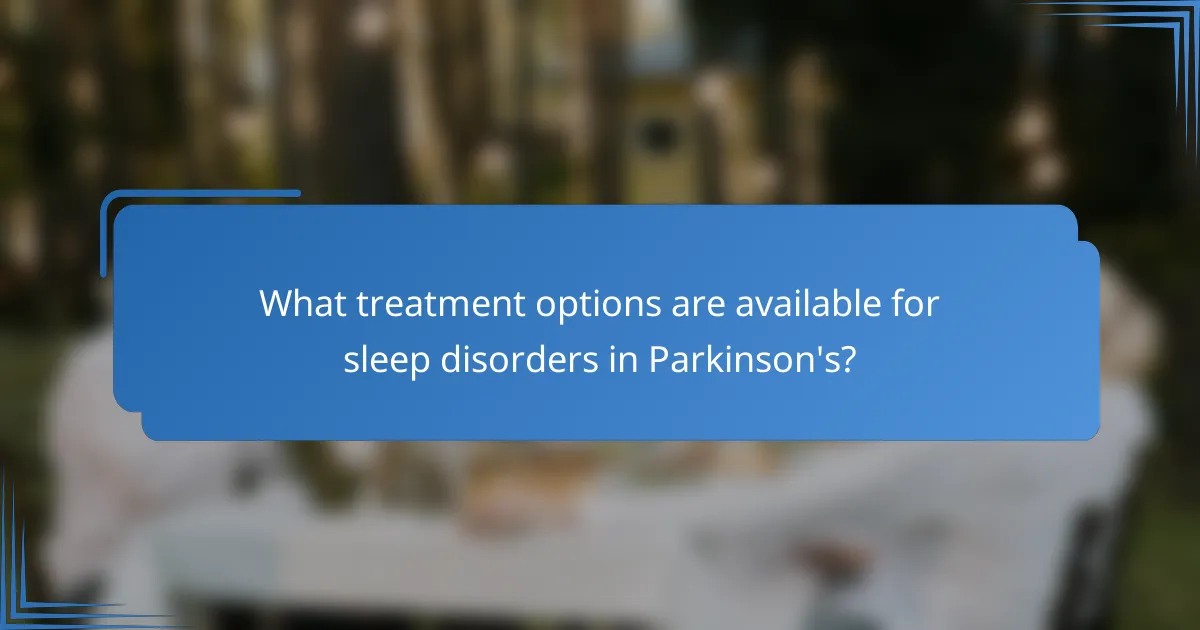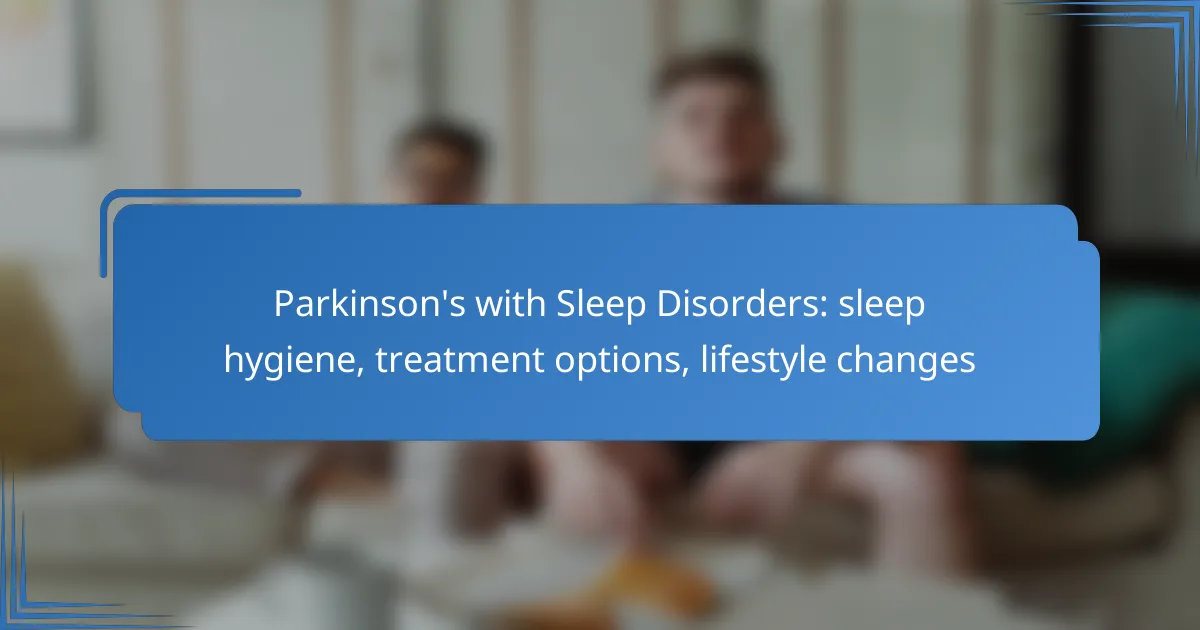Parkinson’s disease often brings sleep disorders that can significantly impact quality of life. Implementing effective sleep hygiene practices, exploring various treatment options, and making targeted lifestyle changes can help manage these challenges and promote restful sleep. By focusing on these strategies, individuals with Parkinson’s can improve their overall well-being and enhance their nightly rest.

What are effective sleep hygiene practices for Parkinson’s patients in New Zealand?
Effective sleep hygiene practices for Parkinson’s patients in New Zealand focus on establishing routines and environments that promote restful sleep. These practices can significantly improve sleep quality and overall well-being.
Consistent sleep schedule
Maintaining a consistent sleep schedule is crucial for Parkinson’s patients. Going to bed and waking up at the same time each day helps regulate the body’s internal clock, making it easier to fall asleep and wake up refreshed.
Try to stick to this schedule even on weekends. If you need to adjust your sleep time, do so gradually by shifting it by 15–30 minutes each day.
Creating a calming bedtime routine
A calming bedtime routine can signal to your body that it’s time to wind down. Engage in relaxing activities such as reading, gentle stretching, or listening to soft music for about 30 minutes before bed.
Avoid stimulating activities, including screen time, which can interfere with your ability to fall asleep. Consider incorporating mindfulness or breathing exercises to enhance relaxation.
Optimizing sleep environment
Your sleep environment should be conducive to rest. Ensure your bedroom is dark, quiet, and cool, ideally between 16°C and 20°C. Blackout curtains and white noise machines can help minimize disturbances.
Invest in a comfortable mattress and pillows that support your preferred sleeping position. Decluttering your bedroom can also create a more peaceful atmosphere.
Avoiding stimulants before bed
Avoiding stimulants in the hours leading up to bedtime is essential for better sleep. Caffeine and nicotine can disrupt your ability to fall asleep, so limit their intake, especially in the afternoon and evening.
Alcohol may seem to help you fall asleep initially, but it can lead to fragmented sleep later in the night. Aim to avoid alcohol consumption close to bedtime.
Limiting daytime naps
While short naps can be beneficial, lengthy daytime naps may interfere with nighttime sleep. If you need to nap, limit it to 20–30 minutes and avoid napping late in the day.
Consider using naps strategically, such as after physical activity, to recharge without compromising your nighttime rest. If you find that napping disrupts your sleep, try to eliminate it altogether.

What treatment options are available for sleep disorders in Parkinson’s?
Several treatment options exist for managing sleep disorders in individuals with Parkinson’s disease, including prescription medications, cognitive behavioral therapy, melatonin supplementation, and specific treatments for sleep apnea. Each option has unique benefits and considerations that can help improve sleep quality and overall well-being.
Prescription medications
Prescription medications can be effective in treating sleep disorders associated with Parkinson’s. Commonly prescribed drugs include benzodiazepines and certain antidepressants, which may help with insomnia and anxiety. However, these medications can have side effects, such as daytime drowsiness or increased risk of falls, so careful monitoring by a healthcare provider is essential.
It’s important to discuss the potential benefits and risks with a doctor, as some medications may interact with Parkinson’s treatments. Adjusting dosages or trying different medications may be necessary to find the most suitable option.
Cognitive Behavioral Therapy for Insomnia (CBT-I)
Cognitive Behavioral Therapy for Insomnia (CBT-I) is a structured program that helps individuals change thoughts and behaviors that contribute to sleep problems. This therapy is often preferred because it addresses the root causes of insomnia without the side effects associated with medications. CBT-I typically involves techniques such as sleep restriction, stimulus control, and cognitive restructuring.
Patients can work with a trained therapist or use online resources to access CBT-I. Research suggests that it can significantly improve sleep quality and duration, making it a valuable option for those with Parkinson’s-related sleep disorders.
Melatonin supplementation
Melatonin is a hormone that regulates sleep-wake cycles and can be beneficial for individuals with sleep disorders in Parkinson’s. Supplementing with melatonin may help improve sleep onset and overall sleep quality. Typical dosages range from 1 to 5 mg taken about an hour before bedtime.
While melatonin is generally considered safe, it is advisable to consult with a healthcare provider before starting supplementation, especially since it may interact with other medications. Monitoring the effects can help determine the appropriate dosage and timing for optimal results.
Sleep apnea treatment
Sleep apnea is a common issue among individuals with Parkinson’s, characterized by interrupted breathing during sleep. Treatment options include continuous positive airway pressure (CPAP) therapy, which involves wearing a mask that delivers air pressure to keep the airways open. This method can significantly improve sleep quality and reduce daytime fatigue.
In some cases, lifestyle changes such as weight management, positional therapy, or oral appliances may also be recommended. Regular follow-ups with a healthcare provider are crucial to ensure effective management of sleep apnea and to adjust treatments as necessary.

How can lifestyle changes improve sleep for Parkinson’s patients?
Lifestyle changes can significantly enhance sleep quality for Parkinson’s patients by addressing factors that disrupt rest. Implementing specific habits can lead to better sleep hygiene, making it easier to fall asleep and stay asleep throughout the night.
Regular physical activity
Engaging in regular physical activity can help regulate sleep patterns for those with Parkinson’s. Aim for at least 150 minutes of moderate exercise each week, which can include walking, swimming, or cycling. Consistency is key, as exercising at the same time each day can further improve sleep quality.
However, avoid vigorous workouts close to bedtime, as they may have the opposite effect and hinder your ability to fall asleep. Gentle activities like yoga or stretching in the evening can be beneficial instead.
Healthy diet adjustments
Making healthy dietary choices can positively impact sleep for Parkinson’s patients. Focus on a balanced diet rich in fruits, vegetables, whole grains, and lean proteins. Foods high in magnesium, such as nuts and leafy greens, can promote relaxation and improve sleep quality.
Limit heavy meals, caffeine, and sugar intake, particularly in the hours leading up to bedtime. Instead, consider a light snack that includes carbohydrates and protein, such as whole-grain toast with peanut butter, to help facilitate sleep.
Stress management techniques
Implementing stress management techniques can greatly enhance sleep quality for those with Parkinson’s. Practices such as mindfulness meditation, deep breathing exercises, or progressive muscle relaxation can reduce anxiety and promote a sense of calm before bedtime.
Establishing a calming bedtime routine, such as reading or taking a warm bath, can signal to your body that it’s time to wind down. Aim to incorporate these practices into your daily life to create a more peaceful sleep environment.
Avoiding alcohol and nicotine
Avoiding alcohol and nicotine is crucial for improving sleep in Parkinson’s patients. Both substances can disrupt sleep cycles and lead to fragmented rest. Alcohol may initially induce drowsiness but can cause awakenings later in the night, while nicotine is a stimulant that can make it difficult to fall asleep.
Consider replacing these substances with healthier alternatives, such as herbal teas or other non-caffeinated beverages, to promote better sleep hygiene. Making these adjustments can lead to more restorative sleep and improved overall health.

What are the common sleep disorders associated with Parkinson’s?
Individuals with Parkinson’s disease often experience several sleep disorders that can significantly impact their quality of life. Common issues include insomnia, restless legs syndrome, REM sleep behavior disorder, and sleep apnea, each requiring tailored management strategies.
Insomnia
Insomnia in Parkinson’s patients is characterized by difficulty falling asleep, staying asleep, or waking up too early. This can stem from both the disease itself and the medications used to treat it, which may disrupt normal sleep patterns.
To manage insomnia, establishing a consistent sleep schedule is crucial. Patients should aim to go to bed and wake up at the same time each day, creating a routine that signals the body it’s time to sleep. Avoiding stimulants like caffeine in the afternoon and evening can also help improve sleep quality.
Restless Legs Syndrome
Restless legs syndrome (RLS) causes uncomfortable sensations in the legs, often leading to an irresistible urge to move them, particularly at night. This condition can exacerbate sleep disturbances in those with Parkinson’s.
Management of RLS may include lifestyle changes such as regular exercise, maintaining a healthy diet, and avoiding alcohol and tobacco. In some cases, medications specifically for RLS may be recommended by healthcare providers.
REM Sleep Behavior Disorder
REM sleep behavior disorder (RBD) involves acting out dreams during the REM stage of sleep, which can lead to injury for the patient or their partner. This disorder is more prevalent in individuals with Parkinson’s and can disrupt overall sleep quality.
To mitigate RBD, creating a safe sleep environment is essential. This may involve removing sharp objects from the bedroom and using padded bed rails. In some cases, medications like clonazepam may be prescribed to help manage symptoms.
Sleep apnea
Sleep apnea is a condition where breathing repeatedly stops and starts during sleep, leading to fragmented sleep and daytime fatigue. It is common among those with Parkinson’s and can worsen other symptoms of the disease.
Diagnosis typically involves a sleep study, and treatment options may include lifestyle modifications such as weight management, positional therapy, or the use of continuous positive airway pressure (CPAP) devices. Regular follow-ups with healthcare providers are important to ensure effective management of sleep apnea in Parkinson’s patients.

How do Parkinson’s symptoms impact sleep quality?
Parkinson’s symptoms can significantly disrupt sleep quality, leading to difficulties in falling asleep and staying asleep. The combination of motor and non-motor symptoms contributes to a fragmented sleep experience, which can exacerbate daytime fatigue and cognitive challenges.
Motor symptoms causing discomfort
Motor symptoms such as tremors, stiffness, and bradykinesia can make it challenging for individuals with Parkinson’s to find a comfortable sleeping position. These symptoms may lead to frequent awakenings during the night, preventing restorative sleep.
To mitigate discomfort, individuals can consider using supportive pillows or adjusting their sleep environment to enhance comfort. Regular physical therapy may also help improve mobility and reduce stiffness, potentially leading to better sleep quality.
Non-motor symptoms affecting sleep
Non-motor symptoms, including anxiety, depression, and restless legs syndrome, can further complicate sleep for those with Parkinson’s. Anxiety and depression can lead to racing thoughts at night, while restless legs syndrome creates an irresistible urge to move, disrupting sleep onset and continuity.
Implementing sleep hygiene practices, such as maintaining a consistent sleep schedule and creating a calming bedtime routine, can help manage these symptoms. Additionally, discussing treatment options with a healthcare provider, such as cognitive behavioral therapy or medication, may provide further relief and improve overall sleep quality.
